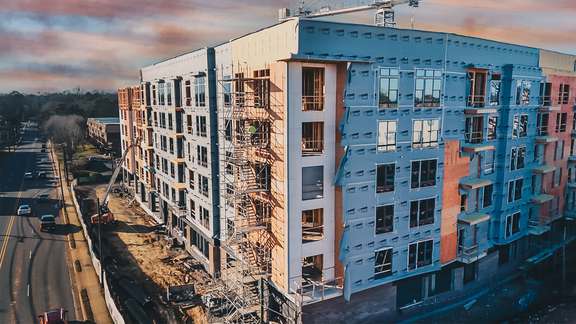What type of financing will you need for real estate?
Before raising capital for real estate, it’s important to understand where in the capital stack you’ll need support. Most multifamily deals are financed with a combination of debt and equity. Sponsors may need to seek both equity partners and lenders to take a deal across the finish line. In general, equity capital is more expensive than debt financing, since equity investors only receive profits after all debt obligations have been satisfied and expect greater returns for their risk position.1
But if debt is cheaper, why not finance your deal exclusively with a loan?
Most creditors want to see that you have “skin in the game” in the form of equity. Typically, lenders require a down payment of at least 20-25%.2 This keeps interests aligned between you and your lender, ensuring that you both have a vested interest in your deal’s success.
But finding a lender willing to underwrite the competitive leverage ratios and rates you seek can be a challenge. That’s where a strategic partner comes in. By borrowing from private credit funds like the DLP Lending Fund and DLP Preferred Credit Fund, you can potentially secure the capital you need to close.
What type of financing will you need for real estate?
Before raising capital for real estate, it’s important to understand where in the capital stack you’ll need support. Most multifamily deals are financed with a combination of debt and equity. Sponsors may need to seek both equity partners and lenders to take a deal across the finish line. In general, equity capital is more expensive than debt financing, since equity investors only receive profits after all debt obligations have been satisfied and expect greater returns for their risk position.1
But if debt is cheaper, why not finance your deal exclusively with a loan?
Most creditors want to see that you have “skin in the game” in the form of equity. Typically, lenders require a down payment of at least 20-25%.2 This keeps interests aligned between you and your lender, ensuring that you both have a vested interest in your deal’s success.
But finding a lender willing to underwrite the competitive leverage ratios and rates you seek can be a challenge. That’s where a strategic partner comes in. By borrowing from private credit funds like the DLP Lending Fund and DLP Preferred Credit Fund, you can potentially secure the capital you need to close.
Financing solutions for real estate sponsors
Debt solutions
Debt is the foundation of most real estate acquisitions, and sponsors have multiple options:
- Multifamily Bridge Loans: Short-term loans (24-36 months) designed to help “bridge” financing gaps between acquisition and stabilization. During this period, sponsors can rehab, renovate, or reposition their multifamily asset. Once it’s leased and stabilized, the sponsor could refinance into a longer-term loan.
- Construction Loans: These short-term loans allow you to finance the acquisition and development of your multifamily, build-to-rent, or manufactured housing project. Once construction is complete, you can sell the asset and pay off the loan or refinance into longer-term debt.
With the DLP Lending Fund, sponsors can access flexible credit solutions designed specifically for value-add and growth-oriented multifamily strategies. Unlike traditional bank debt, the DLP Lending Fund emphasizes sponsor alignment, helping deals close faster.
Equity and preferred credit solutions
Equity is a crucial piece of most deals, but sponsors don’t necessarily want to give away their upside to a bunch of partners.
- Joint Venture (JV) Equity: Partners pool capital and expertise to share risk and reward.
- Preferred Equity: Sitting between debt and common equity in the capital stack, preferred equity gives investors priority returns, while allowing sponsors to retain upside. Preferred equity also functions like debt, offering investors the potential to earn a fixed preferred return, although this fixed rate is usually higher than the interest rate on debt.3
- Mezzanine Financing: A hybrid of debt and equity, mezzanine financing bridges the gap between senior debt and the sponsor’s equity. It is often convertible into an equity stake.
Funds like the DLP Preferred Credit Fund may provide preferred equity that enables sponsors to scale, improve, and build thriving communities while maintaining ownership.
Choosing a financing solution
Many sponsors try to assemble financing from multiple sources—banks, money lenders, private investors—which can create delays, higher costs, and misaligned expectations. Partnering with a capital provider like DLP Capital simplifies the process.
Real estate capital raising: The bottom line
Raising capital for real estate doesn’t have to be a roadblock. With the right strategies—and the right partners—sponsors can confidently finance their next deal and keep scaling.
The DLP Lending Fund and DLP Preferred Credit Fund offer powerful, sponsor-aligned solutions to fill capital gaps, accelerate growth, and strengthen communities. For sponsors ready to take their business to the next level, the opportunities are here.
DLP Capital offers flexible equity and debt financing solutions through its sponsored funds. Discover how these funds can help you scale with confidence and make an impact on America’s working families. Explore your options today.




